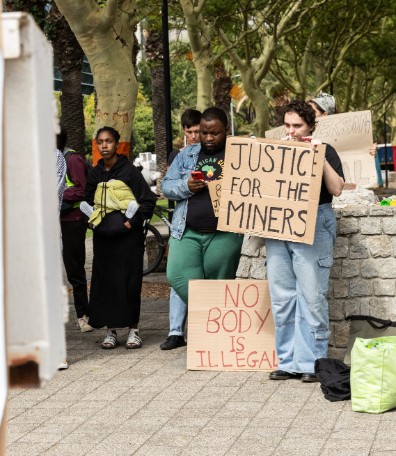Picket at Mining Indaba Demands Justice for Stilfontein Miners, Calls for Reparations

On Wednesday, around 50 activists gathered outside the Cape Town International Convention Centre, where the 2025 Mining Indaba conference was taking place, to demand justice for the victims of the Stilfontein mining tragedy. The group, consisting of families, community members, and civil rights activists, staged a peaceful protest to draw attention to the deaths of nearly 80 miners who perished in a tragic underground disaster at an illegal mining site last month.
The Stilfontein mining incident, which saw over 240 zama zamas informal, often undocumented miners rescued from an abandoned mineshaft, shocked the nation. The miners had been trapped underground for months, suffering from inadequate access to food, water, and medication, while others succumbed to the hazardous conditions in the mine. At least 78 bodies were retrieved in the aftermath, underscoring the scale of the tragedy.
The protestors called for immediate reparations to be paid to the families of the deceased miners, as well as for the government and relevant authorities to take responsibility for the disaster. The activists also sought broader recognition of the systemic problems that contribute to such deadly events in South Africa’s mining industry, where illegal mining operations, often run by zama zamas, have become a persistent issue despite years of government attempts to curb them.
A key point raised by the demonstrators was the allegation that the government’s response to the tragedy had been insufficient, with accusations of xenophobia, racism, and Afrophobia. Many of the trapped miners were reportedly from neighboring countries, including Zimbabwe and Mozambique, and the protesters argued that the lives of these miners had not been given the attention they deserved due to their status as foreign nationals and informal workers.
“Too many lives have been lost, and this is a direct consequence of the state’s failure to address the issues of informal mining in this country,” said one protester, holding a sign that read, “Justice for Stilfontein Miners.” “The government must not only provide reparations to the families but also invest in solutions to stop the exploitation of miners and address the root causes of illegal mining.”
Protest organizers also highlighted concerns over the safety of the zama zamas who continue to work in dangerous conditions, often in the absence of basic protections or oversight. They argue that the lack of legitimate employment opportunities in many communities, especially in rural areas, pushes individuals into hazardous illegal mining activities. With the high risks of death or injury, these miners are vulnerable to exploitation by both criminal groups and neglectful state policies.
The picket at the Mining Indaba also serves as a stark reminder of the deep social and economic issues surrounding South Africa’s mining sector. The country’s mining industry, while one of the most significant contributors to the national economy, has long faced criticism for its lack of investment in worker safety and its failure to address the informal mining sector. Although illegal mining has been a growing concern for years, with zama zamas often working in abandoned mines and on the fringes of the law, the government’s response has been criticized as reactive rather than proactive.
The protest outside the Mining Indaba conference also drew attention to the international nature of the issue. As mining companies and governments from around the world gathered to discuss investments and development in the sector, activists reminded delegates that these discussions cannot overlook the lived realities of the workers in South Africa’s mining industry. The ongoing exploitation of informal miners like the zama zamas was framed by the protesters as a human rights issue that demands immediate attention.
In addition to demanding reparations, the activists called for an independent investigation into the conditions at the Stilfontein mining site and the broader illegal mining industry. They emphasized the need for greater support for mining communities, including safer working conditions, healthcare, and improved economic opportunities to prevent people from resorting to illegal mining in the first place.
The picket also served to remind South Africa’s government and mining industry leaders that, while the economic benefits of mining are crucial, they must not come at the expense of the lives and dignity of workers. Many South Africans have long called for better regulation of the mining sector, and activists are now urging government officials and industry leaders to put meaningful reforms in place to ensure that tragedies like Stilfontein never happen again.
As the Mining Indaba continues, it is clear that the protests are not just about justice for the Stilfontein miners; they are a call for a fundamental rethinking of how South Africa’s mining industry operates, and how it treats its most vulnerable workers.
